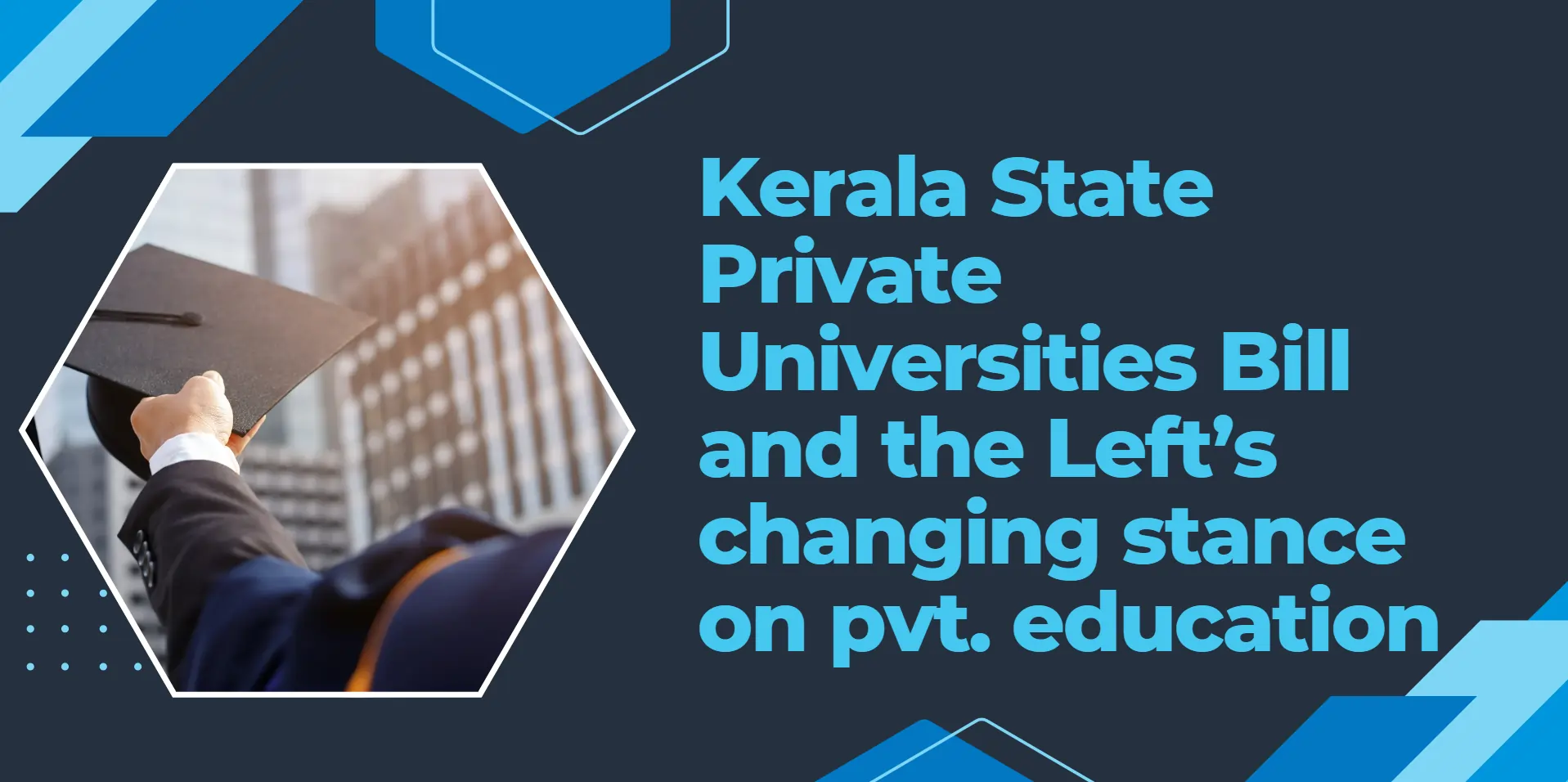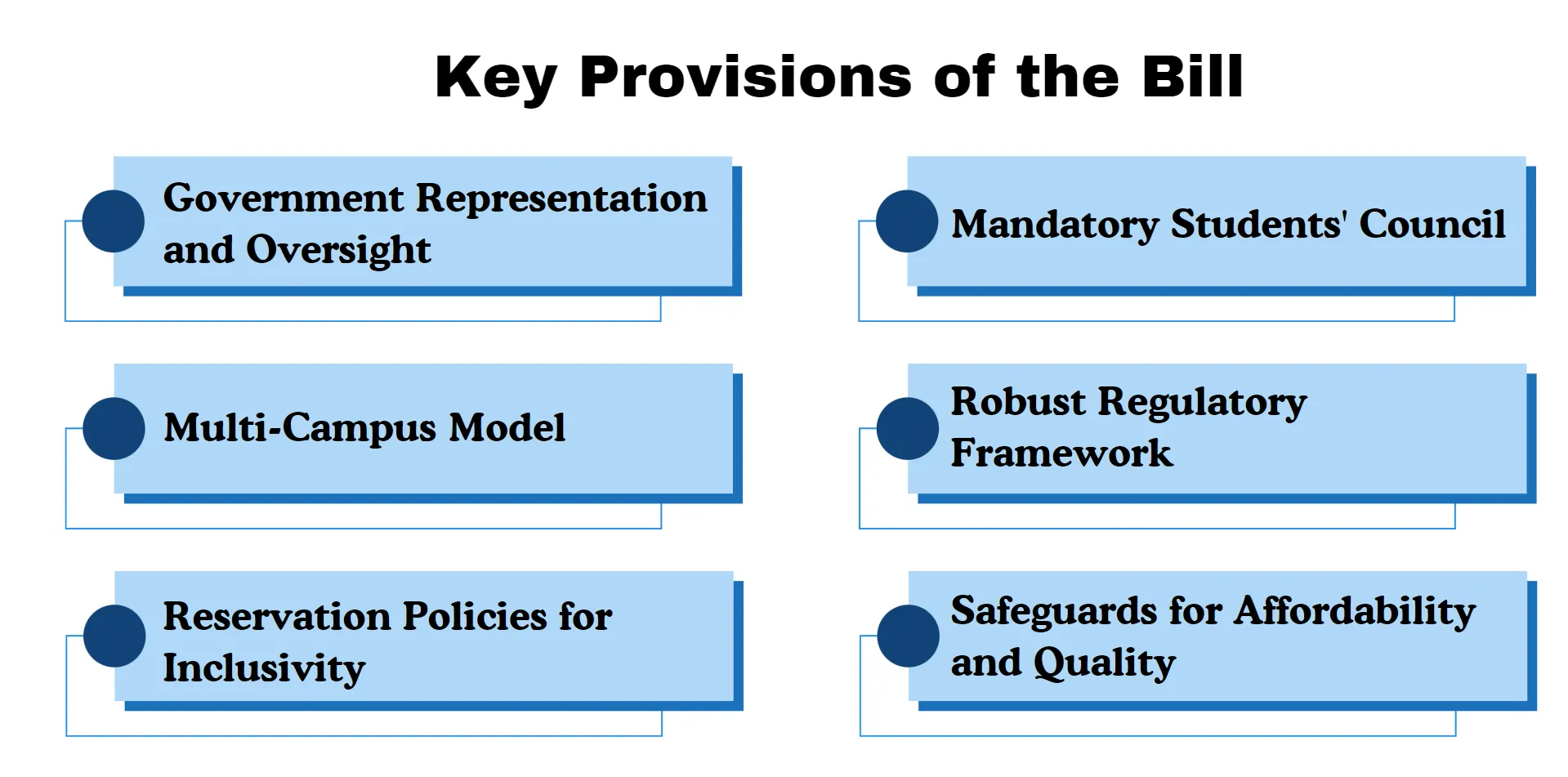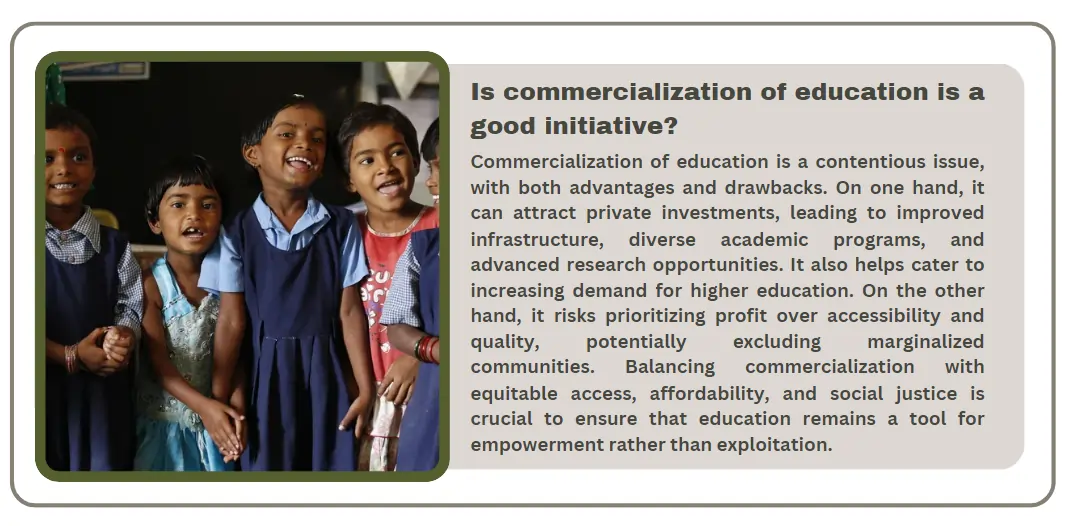The approval of the Kerala State Private Universities Bill, which sought to regulate private institutions and preserve social equity in spite of worries about the effects of commercialization, led to growth in Kerala's higher education sector.

The higher education sector of Kerala achieved significant growth this week when the Kerala State Private Universities Bill received Assembly approval. Kerala faces a major transformation with this law because fighting educational privatization programs has remained its historical stance. Due to its persistent commitment to social justice in public education policies Kerala has avoided creating private universities within its territory. Student migration from Kerala to access superior educational opportunities at different locations prompts discussions about possible changes to the educational system. The government leads this bill to establish laws controlling Kerala-based private universities. The bill maintains social equity protection through governmental quality standards and regulation while allowing private institutions to be funded independently. Supporters view these changes as the way to create Kerala as an educational leader but critics express concerns about public education institutions' exposure to commercialization effects. The emerging educational period of Kerala depends on the Kerala State Private Universities Bill as this legislation shows the fight between modern progress and ethical values to start a dialogue about future educational directions.
Key Provisions of the Bill
The Kerala State Private Universities Bill creates guidelines that manage private university development and administration throughout Kerala for market-derived education growth alongside accreditation maintenance for academic distinction and social equity purposes. This legislative chronicle includes vital elements that outline how to monitor private universities and ensure accessibility as well as answerability to uphold Kerala's leadership principles.

Government Representation and Oversight
A central feature in this legislation outlines specific government involvement in the management of private university institutions. The legislation mandates that government nominees must comprise membership on central decision-making boards like the governing council as well as executive council and academic council. The required state policies enable universities to maintain transparency standards while supporting state norms. Education commercialization remains a target of the bill by imposing state requirements for central decision-making boards that uphold public educational standards and processes.
Multi-Campus Model
Private universities may establish multiple campuses under provisions outlined within the bill because it allows operational flexibility for their structures. The regulation makes it possible for private universities to serve students throughout different parts of Kerala to enhance the availability of high-quality educational opportunities. This multi-campus model plays an essential role to bridge the educational facility gaps across Kerala by letting private institutions serve students throughout the urban and rural parts of the state.
Reservation Policies for Inclusivity
The bill places inclusivity as its central requirement by implementing necessary reservation requirements. The seating policy mandates that private universities maintain a 40% quota specifically for permanent residents of Kerala so their students receive fair access to educational opportunities. The universities must follow state directives that specify seat allotments for Scheduled Castes and Scheduled Tribes along with Other Backward Classes students. These requirements establish social justice principles to safeguard marginalized groups from exclusion in private education institutions.
Mandatory Students' Council
Students receive empowerment through mandatory establishment of Students' Councils within private universities according to the bill. The established body allows students to submit feedback about academic and administrative policy as well as help manage decisions through active participation. The Students' Council presence in the bill confirms its dedication toward creating an educational setting based on student participation and democratic values.
Robust Regulatory Framework
Through its regulatory system the bill establishes rigorous standards which private universities must adhere to regarding their quality performance and accountability practices. The institutions need to satisfy strict standards through owning sufficient land and creating an endowment fund of predetermined monetary value. These safety measures protect education quality by preventing low-quality university growth and allow private institutions to access resources needed for proper delivery of quality education.
The bill provides continuous assessment systems to track private universities together with precise financial and control requirements. The evaluation process consists of scheduled assessments of academic results together with compliance testing of reservation requirements and quality checks on educational programs. The proposed regulatory framework of the bill builds an equal academic landscape between public and private universities in order to protect Kerala's higher education system integrity.
Safeguards for Affordability and Quality
The bill contains provisions which prevent private universities from sacrificing either affordability or educational quality. The appropriate regulatory authorities must endorse fee structures to prevent excessive fee charges against students. The state remains dedicated to providing top-quality educational opportunities while maintaining free accessibility through its established quality assurance systems.
Debates and Controversies
The Kerala State Private Universities Bill has caused major disagreements and heated debates among different stakeholders in Kerala society. Finally supporters believe that the bill serves to improve Kerala's educational situations. Private universities remain a key to developing Kerala's higher education future because they bring contemporary facilities and fresh opportunities and draw external relationships with the world. Patrons of the government regulatory system view reservation policies and oversight as vital components to protect social justice while preventing exploitation of educational institutions.
Several opponents that are part of political parties and academic institutions have expressed major reservations. The opponents of this bill worry about how its passage might enable commercialization activities in education which could create barriers to both quality access and affordability. Opponents claim that private universities threaten to damage Kerala's established system of public universities that currently provides both affordability and inclusion to education. The extensive conditions for accepting land and endowment donations potentially create limits for setting up purpose-driven schools that serve their students best.

The public is doubtful that upholding quality standards along with equity standards requires only government supervision. The discussion between educational reform and social education equity creates a fundamental dispute between modernizing education and upholding social equity standards. Public discussion about the implementation and effects of the bill will probably remain central as the bill starts to take effect.
Comparison with Other States
The Kerala State Private Universities Bill represents an exceptional framework among other Indian state private university legislation by combining private investments and social inclusiveness. The legislation provides government monitoring and inclusiveness but other states follow different structural models for their specific objectives and institutional requirements.
The Tamil Nadu Private Universities Act requires private educational institutions to have 100 acres of continuous land space which establishes ample infrastructure needs for educational activities. The land requirements for establishing private universities in Haryana and Rajasthan range from 10 up to 30 acres which creates an advantageous condition for such institutions. According to the Kerala bill the standards for establishing private universities closely replicate those of Tamil Nadu by promoting quality-focused and accountable institutions.
Each state implements diverse policies regarding educational institution reservations. The bill in Kerala establishes a minimum requirement of 40% seat allocation for permanent residents alongside standardized implementation of SC/ST and OBC quotas to demonstrate its embracing approach. States including Gujarat and Maharashtra direct less attention toward reservation policies since they concentrate on recruiting private investors.
The governance structure of Kerala's bill includes governmental representatives who play an active role in university administration. The government of Kerala implements strong participation of its representatives in university governing bodies although private universities in Karnataka and Uttar Pradesh maintain substantial independence.
The state of Kerala differentiates itself through its comprehensive approach which combines affordable education and strong quality standards. Private universities within Kerala must maintain fee regulations which require approval through government oversight to stop price exploitation. The fee determination policies of Telangana together with Andhra Pradesh give private universities capacity to establish higher tuition prices whereas Kerala maintains regulated fees.
The state of Kerala demonstrates through its social justice-conscious modernization policies a model which other states should align with. Modern education laws, broad student enrolment policies, and governmental control in the Kerala State Private Universities Bill form a balanced system between public and private academic sectors for obtaining fair-quality higher education access.
Implications of the Bill
The introduction of the Kerala State Private Universities Bill implies a fundamental transformation that affects the higher education system of the state through various significant aspects. The policy forms a strategic transformation of Kerala's educational framework since it unites educational progress with established values supporting social equality and fairness.
Opportunities for Growth
A primary effect of this bill enables Kerala to enhance educational facilities. The state gains access to substantial higher education investment when it implements oversight of private universities under regulatory structures. The anticipated funding growth will create conditions which lead to building contemporary educational campuses that support learning activities. The academic programs of private universities incorporate creative course options which focus on worldwide patterns and up-and-coming business requirements. Such measures will transform education quality and enable Kerala to become a prominent center for higher education in India.
Reduction in Student Migration
Student mobility is predicted to decrease because of the newly established private educational institutions. Students from Kerala historically migrated outside their home state to pursue quality education since the public universities in the state struggled to fulfil rising enrolment needs. Private universities created locally give students a chance to study quality education which means they no longer need to migrate for education because they can remain in their home territory.
Challenges for Public Universities
This legislation creates difficulties which primarily affect the public university sector in Kerala. Public universities could face an escalating competition fielded by private institutions which may diminish their enrolment numbers as well as institutional funding. Initiative investments into private universities might cause public education systems to receive less attention and support from resources. The union between public and private higher education institutions depends on skilful leadership to maintain public university success.
Social Equity and Inclusivity
Through reservation policies and government oversight the government expresses its dedication toward creating social equity. The bill requires private universities to guarantee inclusivity because it aims to keep marginalized communities involved in higher education access. The state adopts an advanced model that protects disadvantaged students within privatized educational systems.
Quality Assurance and Regulation
Quality assurance regulations established in the bill will serve to promote institution accountability while maintaining professional standards. Safeguards against poor educational institutions include regular evaluations and controlled facility standards along with monitoring systems that prevent the spread of substandard educational institutions. The proposed measures will protect academic excellence in Kerala while defending students from exploitation and making certain private universities deliver exceptional quality education.
Conclusion
The Kerala State Private Universities Bill stands as a defining milestone for the development of the state university system in Kerala. The proposed legislation establishes new private universities under governmental surveillance to augment facilities and variety of educational programs while stopping the flow of students to other academic institutions. The commitment to inclusiveness, quality control and social justice shows that Kerala supports progressive development. Sound implementation of the Bill requires balancing public university resources with private institutions and keeping education affordable. The achievement of this bill depends on its successful execution and maintaining the promised systems in place. The historical shift experienced by Kerala will direct the academic development trajectory of state education during upcoming times.